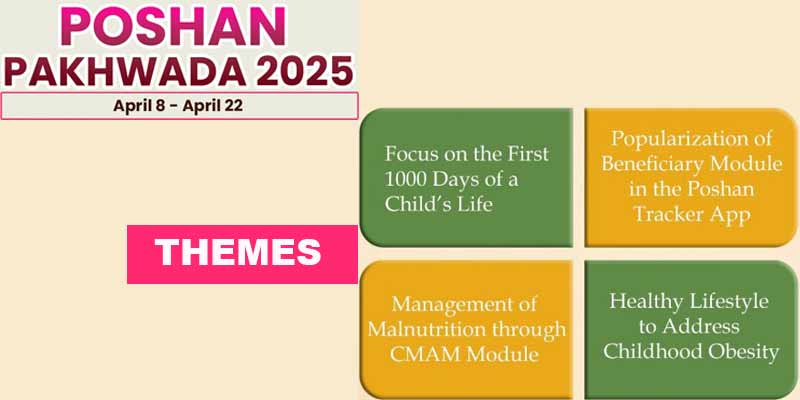- India
- Apr 09
- Sreesha V.M
Govt launches 7th edition of Poshan Pakhwada
• The Ministry of Women and Child Development (WCD) has launched the 7th edition of Poshan Pakhwada from April 8 to 22, as part of the government’s ongoing commitment to address malnutrition.
• The nutrition awareness campaign is part of the Centre’s flagship Poshan Abhiyan.
• Poshan Abhiyan, a flagship initiative launched by Prime Minister Narendra Modi in March 2018, continues its mission to combat malnutrition, improving nutritional outcomes for pregnant women, lactating mothers, adolescent girls, and children under the age of six.
• Poshan Pakhwada, an annual nutrition awareness drive, is not just another campaign — it is a clarion call for action.
• This year’s Poshan Pakhwada will be instrumental in strengthening content, delivery, outreach, and outcomes. As part of the broader Mission Saksham Anganwadi and Poshan 2.0, the initiative focuses on fostering health, wellness, and immunity against diseases and malnutrition.
Poshan Pakhwada 2025 will focus on four key themes:
i) The first 1,000 days of life.
ii) The citizen module of the Poshan Tracker
iii) Community-based management of malnutrition (CMAM)
iv) Promoting healthy lifestyles to tackle childhood obesity.
Why the first 1,000 days matter?
• Imagine a mother, newly expecting, eager to give her child the best start in life. The food she eats, the healthcare she receives, and the guidance she gets in these crucial early months shape not just her baby’s physical health but also shape their mental and emotional health.
• The first 1,000 days — from conception to a child’s second birthday — are the most critical for physical growth and brain development.
• During this time, a baby’s body and mind grow at an incredible speed, laying the foundation for their future learning, immunity, and overall health.
• Therefore, Poshan Abhiyan has given a special emphasis on the first 1,000 days of life, which is actually the magic window for any child.
• Through this year’s themes, Poshan Pakhwada 2025 aims to educate families about the importance of maternal nutrition, proper breastfeeding practices, and the role of a balanced diet in preventing childhood stunting and anemia. The emphasis is also on local solutions — promoting traditional nutritious foods, especially in tribal areas where indigenous diets hold the key to better health.
(The author is a trainer for Civil Services aspirants.)

